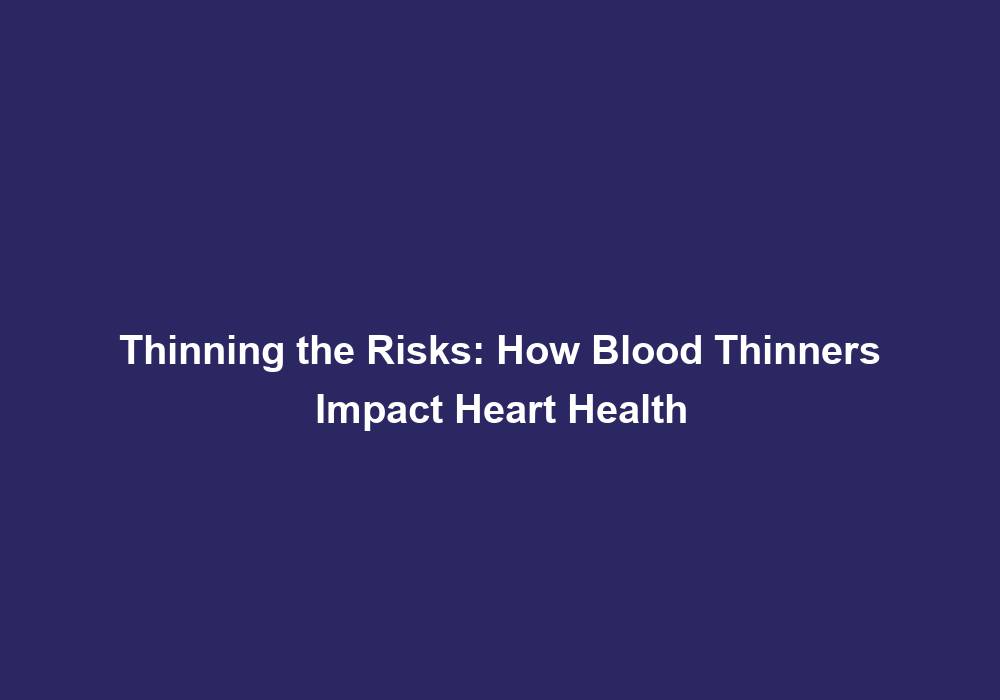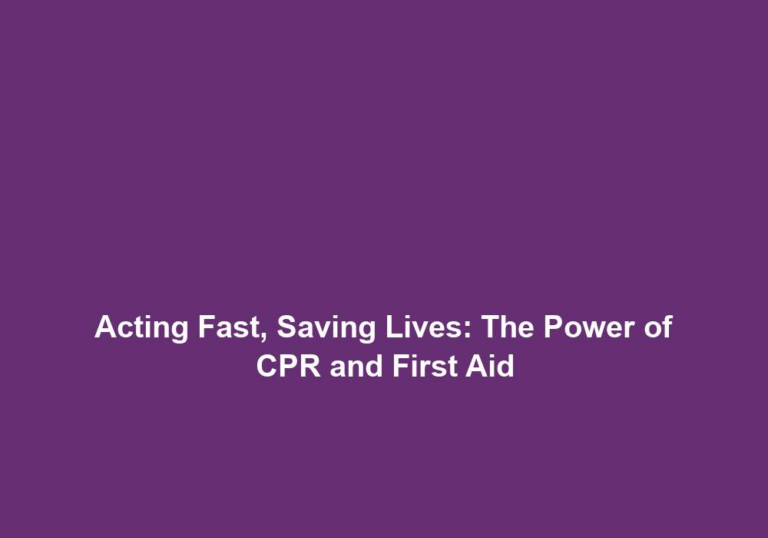Thinning the Risks: How Blood Thinners Impact Heart Health
Blood thinners, also known as anticoagulants, play a crucial role in managing various cardiovascular conditions by reducing the risk of blood clots that can lead to serious complications such as heart attacks and strokes. With their ability to prevent the formation of blood clots, blood thinners have become an essential component of treatment plans for individuals with certain heart conditions. In this article, we will delve into the impact of blood thinners on heart health, exploring their benefits, potential side effects, and important considerations.
Understanding Blood Clots and Their Consequences
Before diving into the discussion of blood thinners, it is important to understand what blood clots are and how they can affect heart health. Blood clots, medically termed as thrombi, are gel-like masses that form when blood platelets and certain proteins in the plasma come together. While blood clots are essential for wound healing and preventing excessive bleeding, they can also pose a significant threat when they occur within blood vessels.
When a blood clot forms in a vessel supplying blood to the heart, it can obstruct blood flow and lead to a heart attack. Similarly, if a clot occurs in an artery supplying blood to the brain, it can cause a stroke. These cardiovascular events can have severe consequences, making the prevention and management of blood clots crucial for maintaining heart health.
Blood thinners work by inhibiting the clotting process in various ways, reducing the risk of blood clot formation in the arteries and veins. By thinning the blood, these medications improve blood flow, allowing vital organs like the heart and brain to receive adequate oxygen and nutrients. Let’s explore some of the commonly prescribed blood thinners and their impact on heart health:
1. Warfarin (Coumadin)
Warfarin is one of the oldest and most widely used blood thinners. It works by reducing the production of certain clotting factors in the liver, thus preventing the formation of blood clots. However, it requires regular monitoring of its effect through blood tests, as its efficacy can be influenced by various factors such as diet and other medications.
2. Direct Oral Anticoagulants (DOACs)
DOACs, including medications like Apixaban, Rivaroxaban, and Dabigatran, have gained popularity in recent years due to their predictable anticoagulant effect and fewer dietary restrictions compared to warfarin. These medications directly target specific clotting factors to prevent the formation of blood clots. DOACs offer a convenient alternative to traditional blood thinners, eliminating the need for frequent blood monitoring.
3. Antiplatelet Agents
While not technically classified as blood thinners, antiplatelet agents such as Aspirin and Clopidogrel are commonly prescribed for individuals at risk of heart attacks or strokes. These medications prevent blood platelets from clumping together, thereby reducing the likelihood of clot formation. Antiplatelet agents are often prescribed in combination with other blood thinners or as a standalone treatment, depending on the specific condition and individual factors.
Benefits and Considerations of Blood Thinners
When it comes to managing heart health, blood thinners offer several notable benefits. These include:
-
Preventing Blood Clots: Blood thinners are highly effective in reducing the risk of blood clot formation, particularly in individuals with a history of heart attacks, strokes, or blood clots. By inhibiting the clotting process, blood thinners help maintain the integrity of blood vessels and promote healthy blood flow.
-
Managing Atrial Fibrillation: Atrial fibrillation (AFib) is a common heart rhythm disorder that can increase the risk of blood clots. Blood thinners are often prescribed to individuals with AFib to minimize the chances of stroke. By preventing clot formation, blood thinners help mitigate the risks associated with AFib and ensure proper blood circulation.
-
Post-Surgical Care: Blood thinners are commonly used after certain cardiovascular procedures, such as heart valve replacement or coronary artery bypass surgery, to prevent clot formation during the recovery period. By maintaining blood flow and preventing clotting, these medications aid in the healing process and reduce the risk of complications.
While blood thinners provide significant benefits, it is important to consider potential side effects and other factors, including:
-
Bleeding Risks: As blood thinners reduce the blood’s ability to clot, the risk of bleeding, both internally and externally, increases. It is crucial to strike a balance between preventing clots and minimizing bleeding risks. Individuals on blood thinners should be cautious and promptly report any signs of excessive bleeding or bruising to their healthcare providers.
-
Drug Interactions: Some blood thinners, such as warfarin, can interact with other medications, including over-the-counter drugs and supplements, potentially affecting their efficacy or causing adverse reactions. It is vital to inform healthcare providers about all medications being taken to avoid potential complications. Regular communication with healthcare professionals helps ensure appropriate dosing and monitoring.
-
Regular Monitoring: Certain blood thinners, like warfarin, require regular blood tests to monitor their effect and adjust the dosage if necessary. Compliance with testing schedules is essential to ensure optimal treatment outcomes. Regular monitoring allows healthcare providers to assess the effectiveness of the medication and make any necessary adjustments to maintain the desired anticoagulant effect.
Lifestyle Considerations and Heart Health
In addition to medication, maintaining a healthy lifestyle plays a vital role in managing heart health. Here are some lifestyle considerations that can complement the effects of blood thinners:
-
Dietary Modifications: Consuming a heart-healthy diet rich in fruits, vegetables, whole grains, and lean proteins can further promote cardiovascular health. These nutrient-dense foods provide essential vitamins and minerals that support optimal heart function. Limiting the intake of high-fat and high-sodium foods is also beneficial, as they can contribute to the development of cardiovascular diseases.
-
Regular Exercise: Engaging in regular physical activity, as recommended by healthcare professionals, can help improve overall cardiovascular fitness and reduce the risk of blood clots. Exercise promotes healthy blood circulation, strengthens the heart muscle, and helps maintain a healthy weight. It is important to choose activities that are suitable for individual fitness levels and to gradually increase the intensity and duration of exercise over time.
-
Smoking Cessation: Smoking increases the risk of heart disease and can interact negatively with blood thinners. Quitting smoking is crucial to optimize heart health. The chemicals in tobacco smoke can damage blood vessels and promote the formation of blood clots. By quitting smoking, individuals can significantly reduce their risk of heart-related complications and enhance the effectiveness of blood thinner therapy.
-
Alcohol Consumption: Moderate alcohol intake is generally considered acceptable for individuals on blood thinners. However, it is essential to consult with a healthcare provider to determine the appropriate level of alcohol consumption based on individual circumstances. Excessive alcohol consumption can increase the risk of bleeding and interact with certain blood thinners. Healthcare professionals can provide personalized recommendations regarding alcohol intake to ensure the safe and effective use of blood thinners.
Conclusion
Blood thinners, with their ability to prevent blood clot formation, significantly impact heart health. Whether it is managing existing conditions like AFib or reducing the risk of blood clots after surgery, these medications play a crucial role in preventing life-threatening events such as heart attacks and strokes. However, it is important to consider potential side effects, drug interactions, and lifestyle modifications alongside blood thinner therapy. By partnering with healthcare professionals and adopting a comprehensive approach, individuals can effectively thin the risks and promote a healthy heart.







